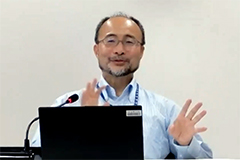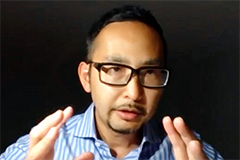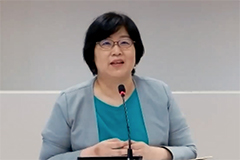Making Pandemic Preparedness an International Security Priority and Establishing a New System for the International Community: Discussion Held at Knowledge Forum
2021.08.27
On June 29, 2021, JICA Ogata Sadako Research Institute for Peace and Development (JICA Ogata Research Institute) held the Knowledge Forum, “Reforming the International System to Make the COVID-19 the Last Pandemic —How the Independent Panel for Pandemic Preparedness and Response Took Action—” in webinar format.
Responding to requests from member countries, the World Health Organization (WHO) established the Independent Panel for Pandemic Preparedness and Response to assess the international community’s response to COVID-19. The panel consists of eleven panel members, including former heads of states and experts in the field of health and hygiene, and a secretariat in charge of putting together the analyses and recommendations. The panel objectively assessed the COVID-19 response by international institutions (including WHO) and governments. It published its final report in May 2021 with proposals on reforming the international system to prevent another pandemic from happening. Mabuchi Shunsuke, the only Asian member in the panel’s secretariat and senior advisor to the Bill & Melinda Gates Foundation, was invited to the Knowledge Forum to discuss and exchange opinions regarding problems in the COVID-19 response and actions that must be taken internationally going forward.

Makino Koji, deputy director of the JICA Ogata Research Institute, gave his opening remarks
The forum began with opening remarks by Makino Koji, deputy director of the JICA Ogata Research Institute. He said, “We hope to hear information only a panel secretariat member would know, for example regarding the process of coordination within the independent panel, and discuss reforming the international system.”
During his keynote speech, Mabuchi introduced the overview of the final report, including a chronology of events from the discovery of the coronavirus and a comparative analysis of countries that responded well and those that did not. According to Mabuchi, the reason why it became a pandemic was because none of the countries or organizations had a pandemic prevention strategy and there were multiple errors made at various stages, from the discovery of the virus to WHO’s alert and initial responses within each country. He explained that the final report recommends making pandemic preparedness an international security priority and newly establishing the Global Health Threats Council, co-chaired by heads of states, to lead initiatives in preventing pandemics in the future. He said WHO should be given greater authority to speed up the pandemic response and undergo reform for heightened independence, as it should specialize and concentrate on establishing strategies and offering guidance in the field of health and hygiene. Regarding funding, he noted it will be necessary to ensure the financial independence of WHO, for example by having each country contribute an assigned amount according to their economic situation. Mabuchi said, “We have no chance against pandemics unless we reform every aspect of the system, including extensive preparedness in every country, greater agility from discovery to alert, and a large funding pool with investment by multiple countries to prevent vaccine inequity. There have already been discussions on the final report, with much approval, at the recent World Health Assembly and G7 Summit. It will be noteworthy what decisions countries will make at the upcoming UN General Assembly and G20 Summit.”

Mabuchi Shunsuke, secretariat member for the Independent Panel for Pandemic Preparedness and Response secretariat, gave the keynote speech
Next was the talk session moderated by Makimoto Saeda, principle research fellow of JICA Ogata Research Institute, who asked Mabuchi, “What was the significance of having an Asian member in the independent panel secretariat, and what did you learn from the experience?” Mabuchi answered, “Asian countries had relatively better responses to COVID-19, but the reality is there are few Asian members in such international panels. This may be because we do not have many globally recognized global health leaders in Asia. I learned about the different leadership styles of the different panel members. It is critically important to share Asia’s experiences and good practices to the world. However, in order to do so, I realized that we must learn to be effective global leaders.”

Makimoto Saeda, principle research fellow of JICA Ogata Research Institute, moderated a talk session
Makino asked, “Most recommendations from the independent panel look to take a top-down approach, but considering the aspect of human security, isn’t it also important to take a bottom-up approach?” Mabuchi responded, “I agree. While working at the World Bank, I was involved in the West Africa Ebola Outbreak response. Brilliant central government officials took leadership at the local level and reinforced cooperation with communities. When COVID-19 hit, this experience became the foundation of their response. African and Asian countries that responded well had wonderful management coordination and vigorous activity at the community level.”
During the Q&A session, there were many questions by participants and energetic discussions on multiple topics, such as scaling back WHO’s functions, the background to why vaccine rollout is slow in Africa, competition between existing projects and the new issue of pandemic preparedness.
JICA Ogata Sadako Research Institute for Peace and Development Knowledge Forum:
In January 2019, the JICA Ogata Research Institute launched the Forum as a venue for unfettered discussion on international development by engaging people from diverse backgrounds and perspectives. The Forum aims to serve as a knowledge co-creation platform to facilitate the sharing of knowledge on development cooperation with various stakeholders.
[Knowledge Forum] Reforming the International System to Make the COVID-19 the Last Pandemic

事業事前評価表(地球規模課題対応国際科学技術協力(SATREPS)).国際協力機構 地球環境部 . 防災第一チーム. 1.案件名.国 名: フィリピン共和国.

事業事前評価表(地球規模課題対応国際科学技術協力(SATREPS)).国際協力機構 地球環境部 . 防災第一チーム. 1.案件名.国 名: フィリピン共和国.

事業事前評価表(地球規模課題対応国際科学技術協力(SATREPS)).国際協力機構 地球環境部 . 防災第一チーム. 1.案件名.国 名: フィリピン共和国.

事業事前評価表(地球規模課題対応国際科学技術協力(SATREPS)).国際協力機構 地球環境部 . 防災第一チーム. 1.案件名.国 名: フィリピン共和国.

事業事前評価表(地球規模課題対応国際科学技術協力(SATREPS)).国際協力機構 地球環境部 . 防災第一チーム. 1.案件名.国 名: フィリピン共和国.